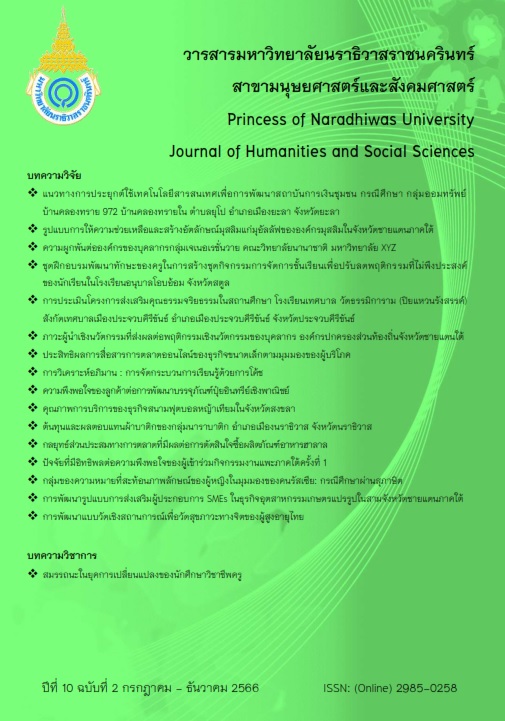Competency in the era of teacher professional students
Main Article Content
Abstract
The competency of teachers is vital for the development of education and the quality of learners; therefore, the educational institutes have set a framework of teachers’ competencies to develop and evaluate student teachers’ competencies as stated in the Thailand National Education Act, B.E. 2542 that the relevant organizations must supervise and cooperate with the educational institutions to prompt the development of student teachers’ competencies in the 21st century. Competency means hidden attributes of individuals as a result of knowledge, skills, motivations, attitudes, and other attributes that enable individuals to produce benchmark results in their responsible work. Thus, teachers’ competencies are essential for the effective practice of the teaching profession to meet the requirements of educational organizations in the education reform era. Also, Teachers Council of Thailand Board issued the announcement to define the details of competencies as the standard of knowledge and experience to practice the teaching profession. Thereby, it can be used as a criterion for accreditation of the degree or educational certificates for teaching profession which various institutions propose the Teachers Council to certify from the academic year 2019 onwards. Applicants for teachers’ licenses, both Thai and foreign teachers must pass the test and evaluation of teachers’ competencies. Therefore, teachers’ competencies are vital to develop qualities of teachers to be knowledgeable, competent, and to emphasis on the teaching-learning process along with the cultivation of morality, ethics and professional skills. Admittedly, the evaluation of all dimensions must involve teachers’ competencies to be in line with the changing era which emphasizes competencies as the basis for teaching and learning management and assessment, unlike focusing on the standard-based curriculum as before.
Article Details

This work is licensed under a Creative Commons Attribution-NonCommercial-NoDerivatives 4.0 International License.
References
ตรีนุช เทียนทอง. (2566). “กลุ่มมรภ.38 แห่งเปิดโมเดลพัฒนาครูฐานสมรรถนะ”. สืบค้นจาก https://www.dailynews.co.th/news/1996231/
เทื้อน ทองแก้ว. (2556). สมรรถนะ(Competency): หลักการและแนวปฏิบัติ. กรุงเทพฯ: มหาวิทยาลัย สวนดุสิต.
บังอร เสรีรัตน์. (2562). บรรยายพิเศษ โครงการ พัฒนาระบบบริหารจัดการด้านการประกันคุณภาพการศึกษา : มหกรรมแลกเปลี่ยนเรียนรู้ แนวปฏิบัติที่ดีในการจัดการเรียนการสอน ครั้งที่ 3 “การเรียนรู้เชิงรุกเพื่อพัฒนาสมรรถนะผู้เรียน” 22 พฤษภาคม 2562. ณ ห้องประชุมคณะมนุษยศาสตร์และสังคมศาสตร์ มหาวิทยาลัยราชภัฏบ้านสมเด็จเจ้าพระยา.
พนา จินดาศรี. (2557). การศึกษาสมรรถนะการจัดการเรียนรู้ของนักศึกษาวิชาชีพครู มหาวิทยาลัยราชภัฏสุรินทร์ในบทความวิชาการวิจัย (รายงานการวิจัย). กรุงเทพฯ: สมาคมวิจัย สถาบันและพัฒนาอุดมศึกษา.
สำนักงานคณะกรรมการการศึกษาขั้นพื้นฐาน. (2553). คู่มือการประเมินสมรรถนะครู. กรุงเทพฯ: สำนักงานคณะกรรมการข้าราชการครูและบุคลากรทางการศึกษา.
พิมพันธ์ เดชะคุปต์ และพรทิพย์ แข็งขัน. (2551). สมรรถนะครูและแนวทางการพัฒนาครูในสังคมที่เปลี่ยนแปลง. กรุงเทพฯ: พริกหวานกราฟฟิก.
มาตรฐานความรู้วิชาชีพครูฐานสมรรถนะของคุรุสภา. (2561). ประกาศคณะกรรมการคุรุสภา เรื่องสาระความรู้ สมรรถนะ และประสบการณ์วิชาชีพของผู้ประกอบวิชาชีพครู. กรุงเทพฯ: สำนักงานเลขาธิการคุรุสภา.
ราชกิจจานุเบกษา. (2563). ประกาศคณะกรรมการคุรุสภา เรื่อง รายละเอียดของมาตรฐานความรู้และประสบการณ์วิชาชีพครูตามข้อบังคับคุรุสภา ว่าด้วยมาตรฐานวิชาชีพ (ฉบับที่ 4) พ.ศ. 2562. สืบค้นจาก http://www.ratchakitcha.soc.go.th/DATA/PDF/2563/E/109/T_0010.PDF.
วนิดา ภูวนารถนุรักษ์. (2552). สมรรถนะครูไทย. วารสารรามคําแหง, 26(5), 61-71.
วิจารณ พานิช. (2555). องค์แห่งการเรียนรู้และการจัดการความรู้. กรุงเทพฯ: ตถาตาพับบลิเคชัน.
วิโฬฏฐ์ วัฒนานิมิตกูล. (2563). บอกเล่าสาระสำคัญในการปรับปรุงเกณฑ์มาตรฐานระดับอุดมศึกษา และ มคอ. : ปรับประยุกต์สู่การปฏิบัติ. กรุงเทพฯ: มหาวิทยาลัยราชภัฏบ้านสมเด็จเจ้าพระยา.
สำนักงานเลขาธิการสภาการศึกษา. (2558). นโยบายสํานักงานคณะกรรมการการศึกษาขั้นพื้นฐานปีงบประมาณ. กรุงเทพฯ: ชุมนุมสหกรณ์การเกษตรแห่งประเทศไทย.
สุกัญญา ทองนาค. (2555). การพัฒนาแบบทดสอบสมรรถนะนักศึกษาตามมาตรฐานวิชาชีพครูแบบพหุมิติที่มีการตรวจให้คะแนนแบบพหุวิภาค (วิทยานิพนธ์ปริญญาครุศาสตรดุษฎีบัณฑิต).จุฬาลงกรณ์มหาวิทยาลัย, กรุงเทพฯ.
Boyatzis, R.E. (1982). The Competent Manager: A Model for Effective Performance. New York: John Wiley & Son.
Fey, M. K., & Miltner, R. S. (2000). A competency-based orientation program for new graduate
nurses. Journal of Nursing Administration, 30(3), 126-132.
McClelland, D.C. (1993). Testing for Competence rather than for Intelligence. American Psychologist, 28(1), 1–14.


